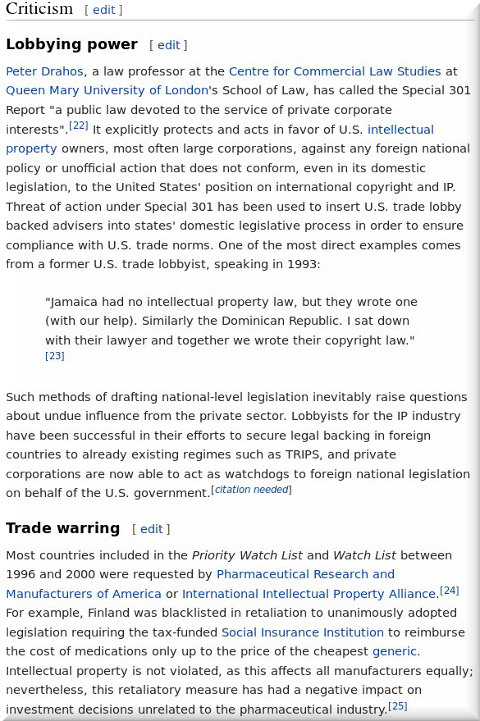

"USTR complains about block of software patents in India while they have Alice," Benjamin Henrion wrote today. For those who are not familiar with the antics of USTR, see examples and details of its bullying in Cablegate articles. Microsoft too uses USTR for influence.
"Microsoft too uses USTR for influence.""USTR complains about Indian block of software patents while they have Alice," Henrion wrote hours later (he found out about it because of Jamie Love, who is a FOSS supporter and also an affordable medicine advocate). Love wrote: "This is one of the business lobbies that pressures India on IPR issues."
In their own words: "Special 301 Report: India’s #IP Climate Continues to Discourage Innovation" (whose innovation?).
USTR is basically an imperialistic corporate army and it needs to be treated as such. We gave examples of how it bullies, shames and potentially sanctions nations that don't play ball for US multinational corporations. Here is the article about it: "The Special 301 Report echoed several of the same outstanding concerns with India’s IP policies that AFTI and its members outlined in recently submitted comments to the USTR. These issues include inadequate trade secret protection in India, continued copyright piracy across India, concerns about compulsory licensing for biopharmaceutical and environmental technology, and unnecessary and burdensome criteria for the patentability of medicines and other products. The USTR report also noted that weak or inadequate IP protections in India have a negative impact on both U.S. and Indian businesses."
"USTR is basically an imperialistic corporate army and it needs to be treated as such."That's nonsense. To quote the PDF from USTR (Henrion has scanned it), "with respect to CII, there was a lack of transparency in the process to adopt the current set of guidelines" ("CII" is just a cheeky term that's often when trying to evade the better known term, "software patents").
In [1] below one can find a report about this from IP Watch. No doubt India's Indians-leaning policies are upsetting some very rich and powerful people in other countries, not just in India. India's long war against the software patents lobby continues with RCEP's clauses. As SFLC has just put it (copy here) in a press release: "Indian law on patentability of computer programmes is abundantly clear in that Section 3(k) of the Patents Act 1970 explicitly excludes computer programmes per se, mathematical methods and algorithms from patent protection. Moreover the recent Guidelines for Examination of Computer Related Inventions released by the Patent Office on February 19, 2016 ensure that patents are granted only to those inventions where a computer programme is claimed in conjunction with novel hardware. This eliminates the possibility of frivolous patents being granted in the field of software in India. However, recently it has come to light that the Regional Comprehensive Partnership Treaty (RCEP) presently being negotiated proposes a clause on patents in the area of computer programmes that will result in patents being granted in this field."
"If China and India care about their future and prosperity, then they will give USTR the middle finger, get out of the RCEP 'trade' agreement and just carry on developing things (India is big for software, China for hardware), not bickering over patents in courtrooms, where English-speaking (usually foreign) lawyers often become necessary because of language barriers."We are disgusted to see these attacks on Indian sovereignty, or on politicians who simply try to establish policy based on human rights, innovation and so on. It's not too hard to see who's behind these attacks, which impact not only India but also China (see [1] below for context). Right now Chinese censorship, for instance, is being cast a "trade barrier" by think tanks and lobbyists of US corporations. These are just opportunistic excuses which try to frame human rights issues as a barrier to US profits in China. And watch what IAM 'magazine' is doing today. When Mr. Schindler says "the Chinese" he probably means "the Chinese lawyers" because IAM believes that more lawsuits are a good thing and wants to increase their frequency. IAM is seemingly worried about barriers to litigation based on yesterday's article. That's really what it's all about. It's exercising power in the courtroom, usually a large company against a small one or a company from a rich country like the US against another company in a poorer country such as India. In the courts, as virtually everyone knows, those with deeper pockets have the cards stacked in their favour (costs of appeals, experienced lawyers, etc.), so who is this all for? It's an imperialistic or colonialist system, which India ought to know enough about, having suffered British occupation for a long time.
If China and India care about their future and prosperity, then they will give USTR the middle finger, get out of the RCEP 'trade' agreement and just carry on developing things (India is big for software, China for hardware), not bickering over patents in courtrooms, where English-speaking (usually foreign) lawyers often become necessary because of language barriers. ⬆
Related/contextual items from the news:
The Office of the United States Trade Representative (USTR) does not hesitate to add even its closest friends to its annual list of concerns about possible inadequate protection of US intellectual property rights. So this year, along with perennial listees China, India and dozens of others, vigorous IP-rights defender Switzerland makes an appearance. The annual Special 301 report was issued today, and in its press release this year, USTR also included its primary client in publishing the list – the rightsholder industry.